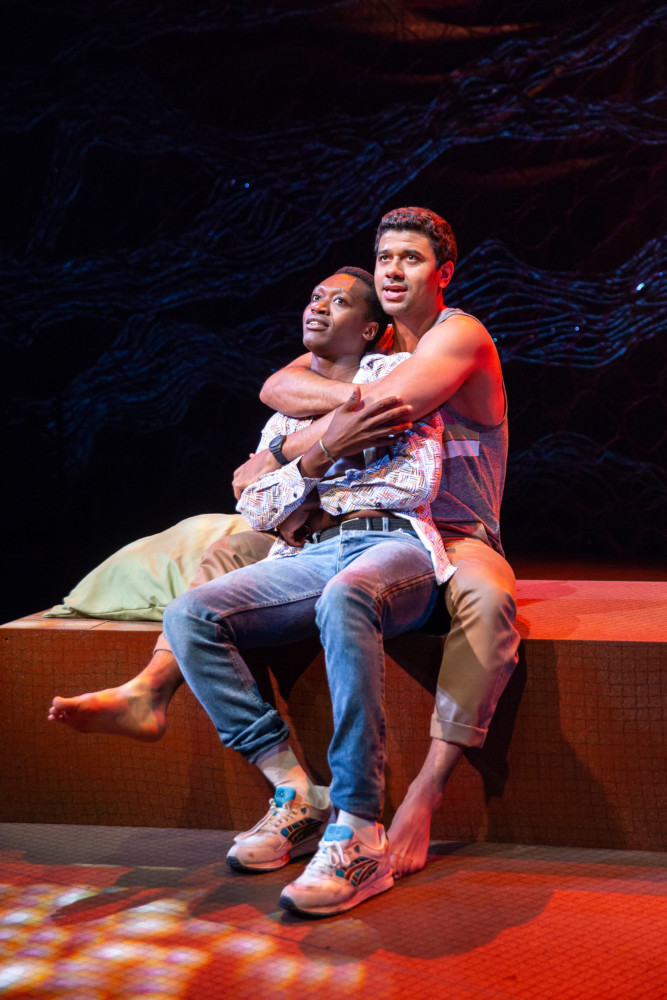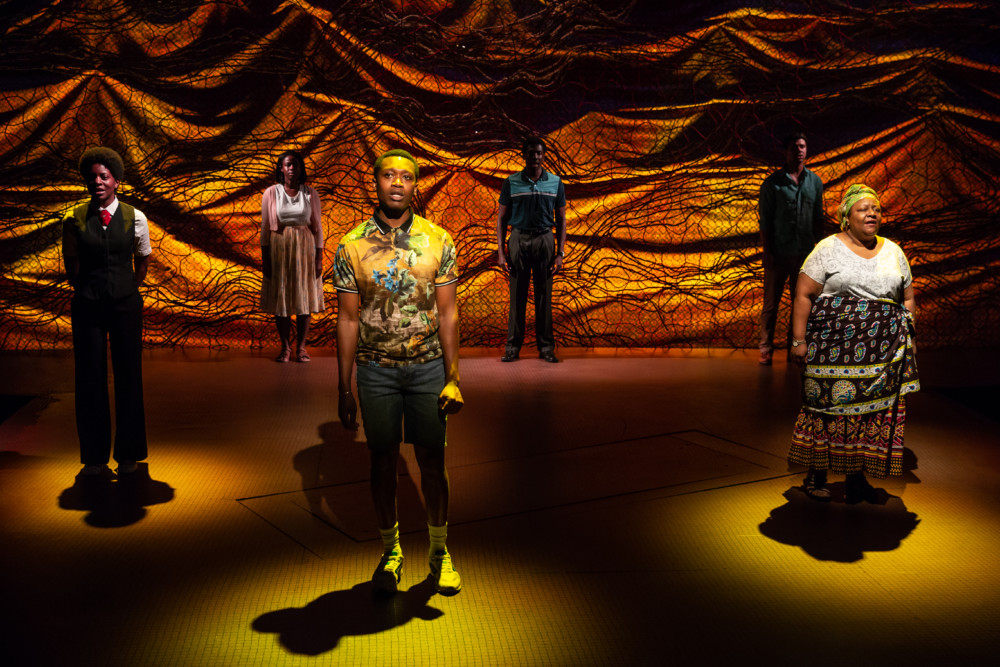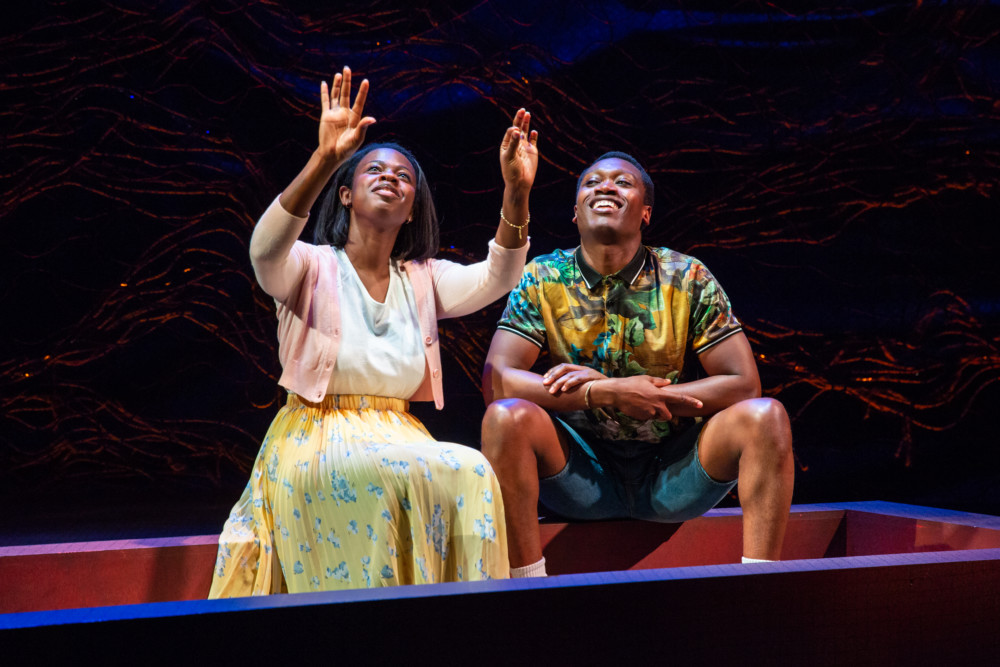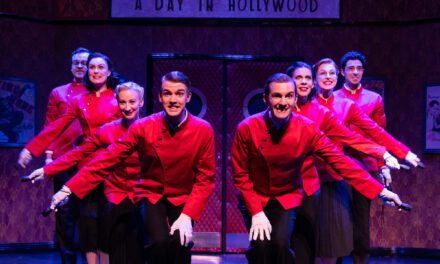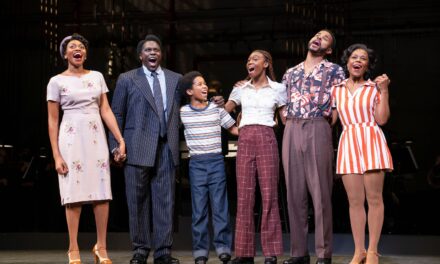Review By Samuel L. Leiter
Arthur Miller’s 1953 classic, The Crucible, uses the 17th-century Salem witchcraft trials as a metaphor for the political “witch hunt” carried out by mid-20th-century rightwing forces against citizens suspected of leftwing sympathies. British playwright Chris Urch’s fitfully satisfying The Rolling Stone, now at the Mitzi E. Newhouse, which has been compared to The Crucible, is about a witch hunt for homosexuals in Uganda in 2010.
Although the play might be considered metaphoric of homophobia (or any social prejudice) in general, it’s unmetaphorically about conditions in Uganda at the time depicted. Of Africa’s 54 countries, homosexuality remains illegal in all but 21, with Uganda’s laws being among the harshest.
One particularly vicious manifestation of this occurred in 2010, when a new tabloid newspaper called The Rolling Stone (with no connection to the American magazine of that name) began publication. Before being banned several months later, following the murder of a gay rights activist, it made a name by not only outing 100 suspected gays, but calling for their deaths with the banner, “Hang Them.”
This is the horrific background to a nearly two-hour drama, sometimes formulaic, sometimes melodramatic, and sometimes rhetorically powerful. It centers on a close-knit family of three, which has just buried its father, a respected Kampala lawyer and preacher. The eldest is Joe (James Udom), a charismatic preacher, who is chosen to assume his father’s pulpit. As a remarkably condemnatory sermon in Act Two demonstrates, he has poisonous ideas about homosexuality.
Then there’s an outspoken sister, Wummie (Latoya Edwards) and a closeted younger brother, the bright and charming Dembe (Ato Blankson-Wood), both of them medical students. Financial difficulties force Wummie to give up her studies and become a hotel maid, a sacrifice she later likens in a fiery diatribe to the true meaning of “love.”
The need to define love (and for Wummie and Dembe to argue God’s existence) arises from the play’s principal complication: the 18-year-old Dembe is not only “kuchu” (queer) but in a relationship with a young doctor, Sam (Robert Gilbert), half-Irish, half-Ugandan (he speaks with a Northern Irish brogue), in the country to do charitable work. His potentially incendiary affair with the boy he loves eventually comes to light, threatening the lives and livelihood of Dembe’s family, threatening to tear them apart.
Further complicating matters is the presence of a vivid maternal figure, Mama (Myra Lucretia Taylor), a powerful church elder, largely responsible for Joe’s pastoral appointment. She has a withdrawn daughter, Naome (Adenike Thomas), who turned mute following a traumatic experience six months earlier, but is considered a suitable mate for Dembe. In a needless subplot, the Scripture-packing Mama, who becomes instrumental in Dembe’s crisis, reveals her own hypocrisy when it seems likely she’d withdraw her animus if Joe’s pious efforts could somehow make Naome speak again.
These unquestionably dramatic circumstances, however, are only occasionally brought to convincing theatrical life. The dialogue, which can be riveting when characters are in direct confrontation, can also be self-consciously witty or poetic, with digressive scenes (like one involving Wummie and Dembe describing clouds) that seem like dramaturgic window dressing. Similarly decorative effects that serve more to make the performance enjoyable than to further its dramatic action include the several well-sung hymnal incursions. (There’s also a sound score with original music by Justin Ellington.)
Act One can’t avoid sounding too obviously expository. It’s also baffling why Sam, who should know better, seems so casual about his sexual orientation in this fraught environment, even to the point of taking pictures of Dembe with his phone that instantly set off foreshadowing alarms.
Act Two, with the situation clearly established, takes good advantage of opportunities for emotional confrontations. It’s by far the more compelling act, although its softly ambiguous ending may not be to everyone’s satisfaction.
Director Saheem Ali’s swift-moving production is on Arnulfo Maldonado’s practically bare, earth-colored set, backed by a wall of artfully arranged netting and canvas. Japhy Weideman’s remarkably varied lighting creates atmospheric miracles on this simple arrangement.
An intense energy pervades the piece, although a relatively gentle scene in a boat (indicated by a simple structure that rises from the ground) between Dembe and the mute Naome, speaking in gestures, helps lower the temperature somewhat.
All the actors, nicely costumed by Dede Ayite, do spot-on work. Blankson-Wood (Slave Play) is sensitive and appealing as Dembe, Udom is strikingly forceful as Joe, Gilbert is expressively urgent as Sam, Thomas is poignantly fragile as Naome, Edwards is frankly straightforward as Wummie, and Taylor is a force of nature as Mama.
The Rolling Stone reminds us of LGBT misery in Uganda in 2010 without noting how the homophobic stone hasn’t stopped rolling there. Nor does it remind us of similar pockets of hatred over here. Despite its several excellences, on this and other fronts it doesn’t always pass the crucible of first-rate drama.
Photos: Jeremy Daniel
The Rolling Stone Mitzi E. Newhouse Theater 150 W. 65th St., NYC Through August 25


